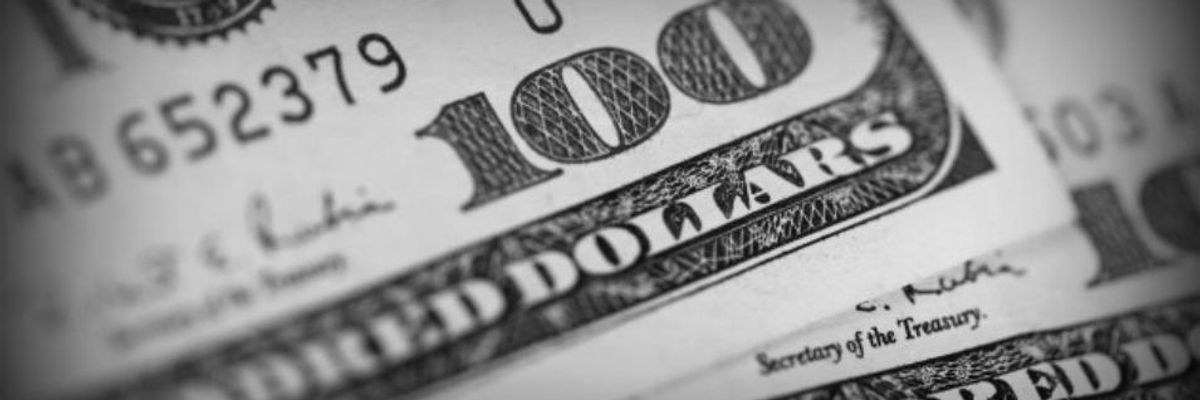If the mainstream media made the effort to analyze and report the facts, the whole country would know about a level of selfishness that has spiraled out of control since the economists of the Reagan era convinced the wealthiest Americans that greed is good for everyone. Here are four extreme examples of that selfishness.
1. Ebola's Not Worth the Money If Only Africans Get Infected
World Health Organization (WHO) director-general Dr. Margaret Chan recently stated: "Ebola emerged nearly four decades ago. Why are clinicians still empty-handed, with no vaccines and no cure? Because Ebola has historically been confined to poor African nations. The R&D incentive is virtually non-existent. A profit-driven industry does not invest in products for markets that cannot pay."
So we turn to philanthropy. But rich donors don't compensate for the flaws of capitalism. The Gates Foundation, among others, may appear noble and praiseworthy for all its charitable giving, but Dr. Chan noted that "My budget [is] highly earmarked, so it is driven by what I call donor interests." Little of that 'earmarking' is toward diseases of the poor. A study in The Lancet of medical products registered in 2000-11 revealed that "Only four new chemical entities were approved for neglected diseases (three for malaria, one for diarrhoeal disease), accounting for 1% of the 336 new chemical entities approved during the study period."
A related problem with philanthropy is summarized by Stacy Palmer, editor of The Chronicle of Philanthropy: "Wealthy people tend to give to colleges, art museums, opera and hospitals very generously...Food banks depend more on lower income Americans."
The Chronicle of Philanthropy confirmed that Americans with annual earnings under $100,000 increased their post-recession giving by 4.5 percent. Americans who earned over $200,000 reduced their giving by 4.6 percent over the same time period.
2. Going To Their Graves Without Paying What They Owe
Charles Koch, who is very much alive, said "I want my fair share - and that's all of it."
His dream is coming true. $30 trillion has been taken since the recession, most of it financial gains, almost all of it by the richest 1%, one-hundred thousand of whom made an estimated $18 million each in three years, and most of whom are so rich that they can let their portfolios sit nearly tax-free until they die, at which point an almost non-existent estate tax ensures nearly tax-free fortunes for their fortunate sons and daughters (only about one out of a thousand estates are taxed).
Yet these are the people who benefit most from national security, infrastructure, tax laws, and patent and copyright laws. They're protected by police who stop and frisk and harass and arrest anyone who threatens the status quo of their wealthy society. But they don't want to pay for all the benefits, even after they're dead.
3. Inventing Rules That Take Money from the Poor
A collection of contrived laws and policies effectively transfer money from the middle class to the rulemakers:
4. Treating Less Fortunate People As If They Don't Exist
Compelling research by Paul Piff and his colleagues has demonstrated that the accumulation of wealth leads to a sense of entitlement and qualities of narcissism. For example, rich people are more likely to flout traffic laws, to take items of value from others, and to cheat when necessary to win a prize or position.
At a higher level, irrefutable data has been accumulated to confirm the relentless flow of money away from our most vulnerable citizens:
Children: One out of every five American children lives in poverty, and for black children under the age of six it's nearly one out of TWO. Almost half of food stamp recipients are children. Worldwide, 76 million children are living in poverty in the developed world, and hundreds of millions more in the developing world.
The Elderly:Three-quarters of Americans approaching retirement in 2010 had an average of less than $30,000 to support them in their retirement years.
The Homeless: According to The Nation, there are now more homeless people in New York City than at any time since the 1970s, and the number of homeless schoolchildren is at an all-time high.
The Sick and Disabled: Over 200 recent studies have confirmed a link between financial stress and sickness. In just 20 years America's ranking among developed countries dropped on nearly every major health measure.
Privileged people, oblivious to the realities beneath their lofty positions, talk about struggling Americans getting "comfortable" in poverty, using food stamps to buy expensive food, and resting in the "hammock" of the safety net. Perhaps delusion helps them to rationalize their selfishness.

